OpenFortiGUI is an open-source VPN-Client to connect to Fortigate and Barracuda VPN-Hardware. For Fortigate VPN it uses openfortivpn, for Barracuda it uses the official Barracuda VPN Client (must be installed) and adds an easy to use and nice GUI on top of it, written in Qt5.
Unlike other VPN-clients it is also possible to connect to multiple VPN-destinations simultaneously (for Fortigate only). It is an alternative for the closed-source Forticlient – SSLVPN Client.
Features include:
- Qt5 GUI
- Fortigate: openfortivpn library built-in, no separate download required
- Barracuda: Official Barracuda VPN Client required, you must first download from Barracuda download site
- All settings saved in text-files, so easy to share, passwords saved AES-encrypted (key can be defined as needed, GNOME keyring & KWallet support)
- VPNs divided into local and global sections (readonly, useful for enterprise deployments to many users)
- VPN-groups can be defined to start defined groups of VPNs at the same time
- Trayicon with fast access to start/stop VPNs and groups
- Multiple VPN connections possible simultaneously
- Certificate and user/password auth supported
- 2Factor support (TOTP)
- Autostart VPNs on program startup
- English, german, catalan (thanks wagafo@github) and japanese (thanks tsundeoku@github) language
- Optional: KRunner Plugin for KDE5
Source & community development: https://github.com/theinvisible/openfortigui
Prebuild packages are available for following Distros:
Last Update 9.2.2024
https://apt.iteas.at/iteas/pool/main/o/openfortigui/
Recommended: Use our apt mirror, for instructions see: https://apt.iteas.at/
Available packages on our apt mirror: openfortigui and openfortigui-runner
Quick instruction to build from source:
- Install DEV-tools (on Ubuntu: build-essential, qt5-default, libssl-dev, qt5keychain-dev)
- git clone https://github.com/theinvisible/openfortigui.git
- cd openfortigui && git submodule init && git submodule update
- qmake && make -j4
- openfortigui binary is ready
Debugging
If you want to help debugging please follow the next steps to produce a debug binary.
- Install DEV-tools (on Ubuntu: build-essential, qt5-default, libssl-dev, qt5keychain-dev)
- git clone https://github.com/theinvisible/openfortigui.git
- cd openfortigui && git submodule init && git submodule update
- qmake openfortigui-project.pro -spec linux-g++ CONFIG+=debug CONFIG+=qml_debug && /usr/bin/make -j4
- openfortigui debug binary is ready
OpenFortiGUI spawns new processes for every VPN connection profile.
You can also start a VPN connection on terminal and so use gdb. For example: sudo /usr/bin/openfortigui –start-vpn –vpn-name [yourvpnname] –main-config ‘/home/[yourusername]/.openfortigui/main.conf’
Just replace [yourvpnname] with your vpn profile name and [yourusername] with your Linux username.
Used software/libraries/resources:
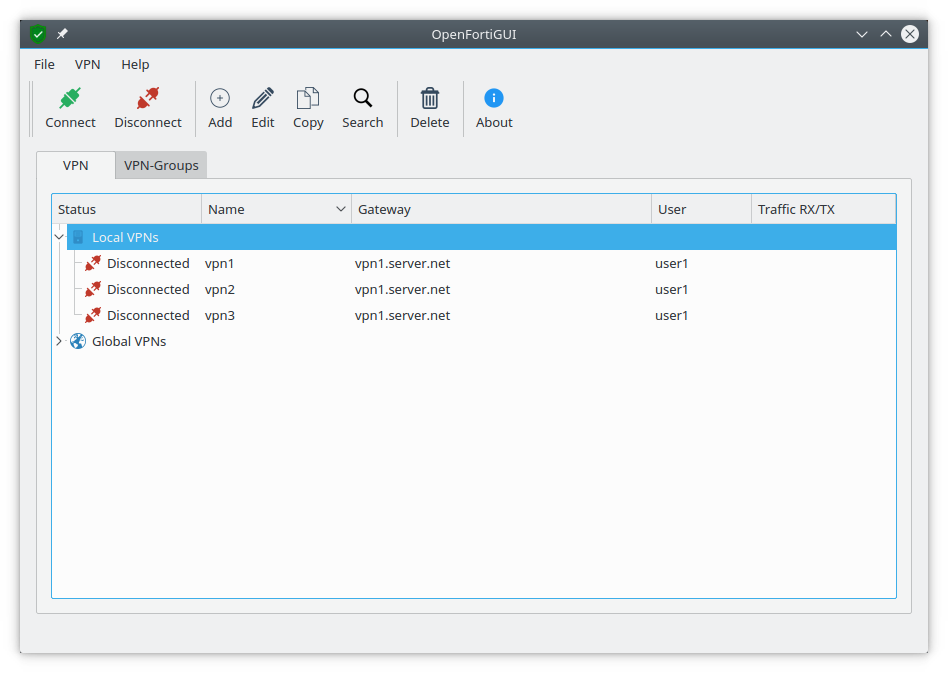
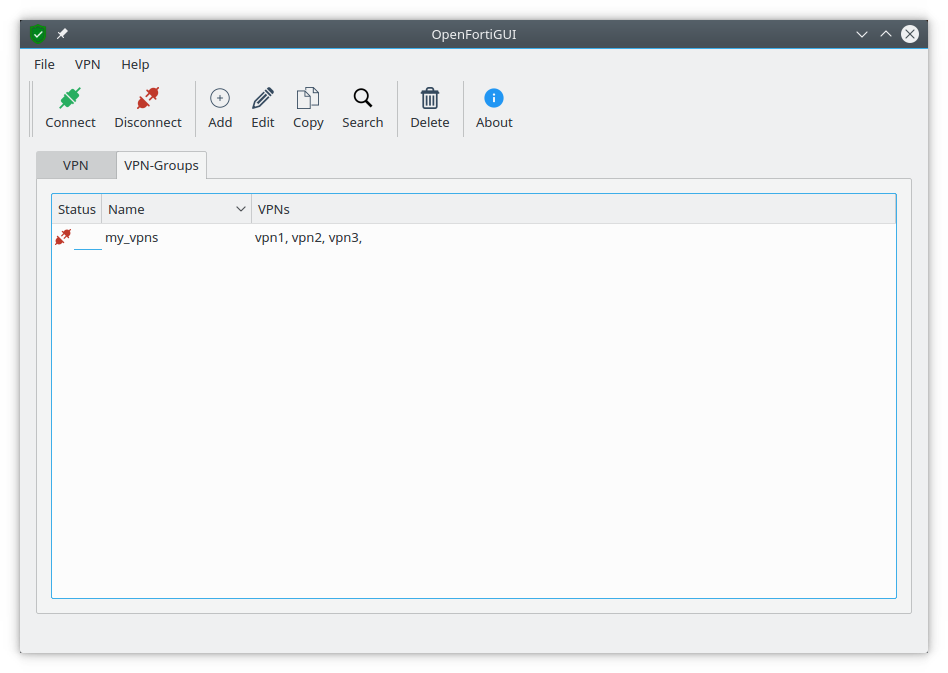
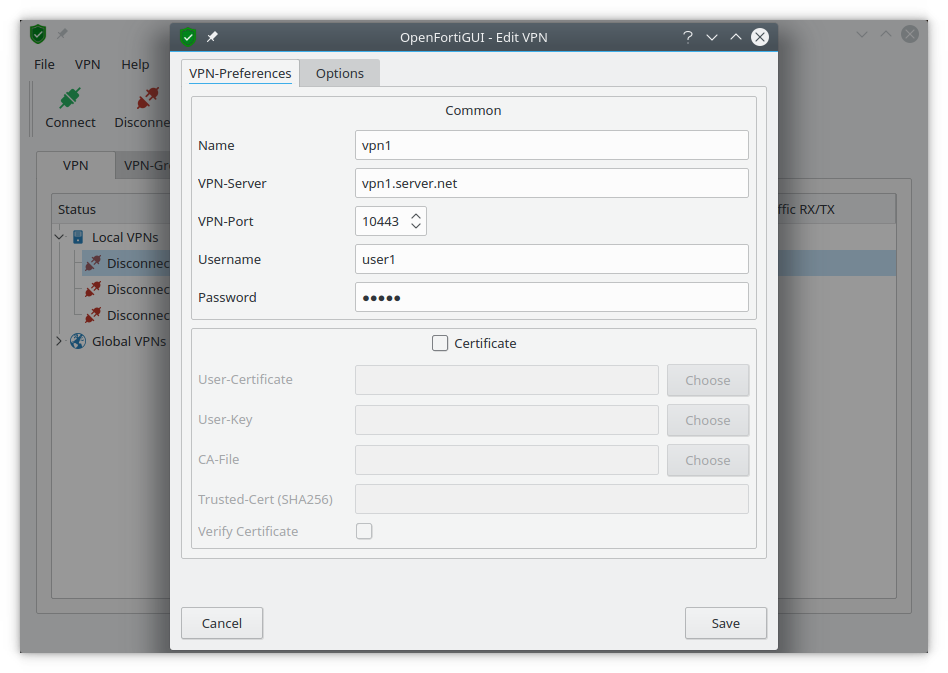

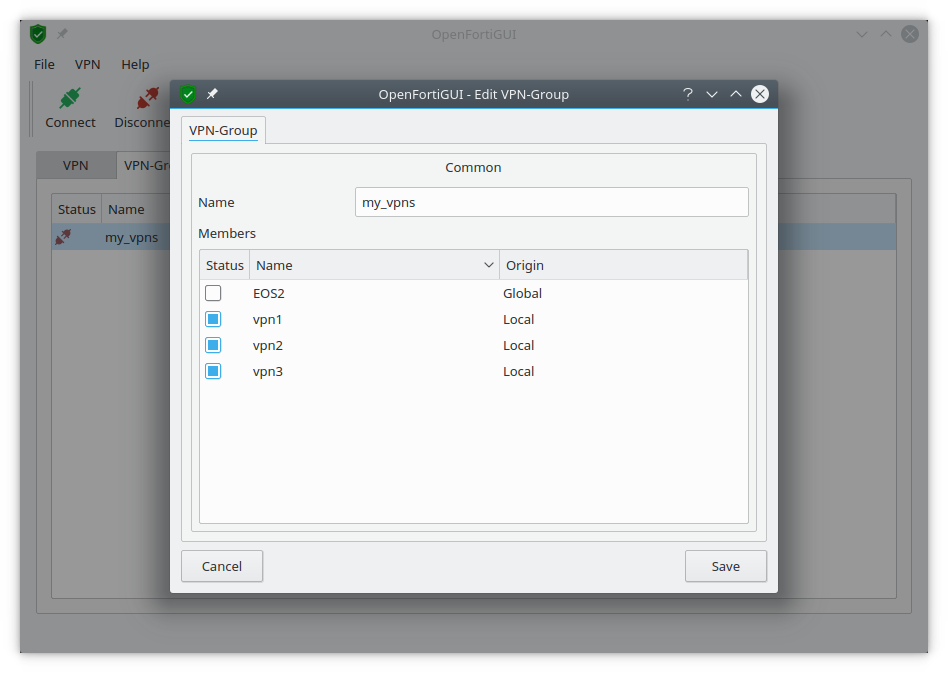
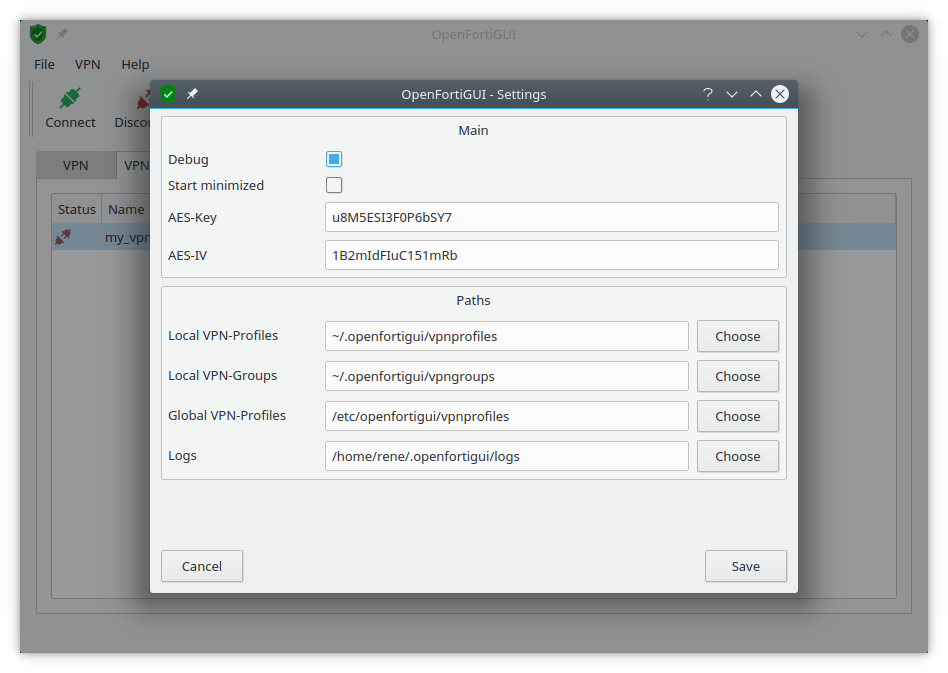
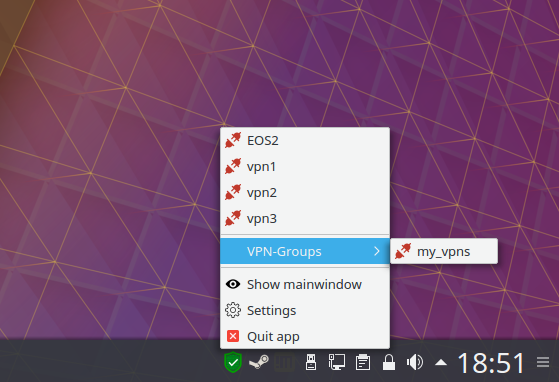
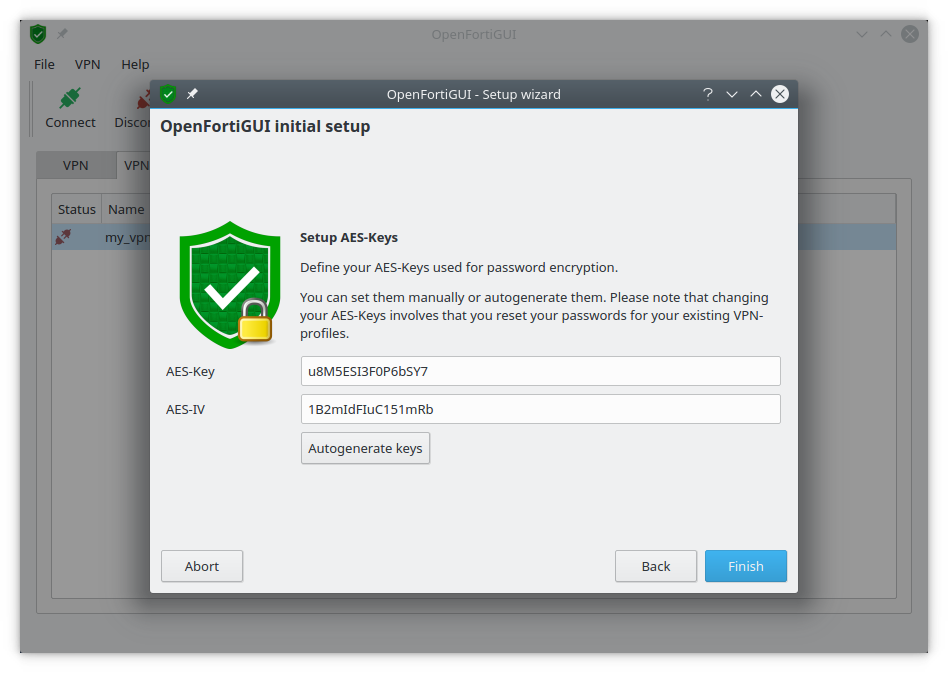
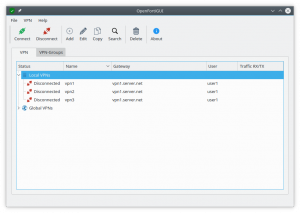
OpenFortiGUI 0.8.0 64bit not working for me, where Forticlient SSLVPN 4.4.2333-1 64bit works.
This client says ‘Connecting’, and ‘Disconnected’ after a while.
And puts two lines in logs:
INFO: Start tunnel.
INFO: Connected to gateway.
How can I use pfx certificate?
Not able to connect to the VPN.
How to remove the trusted-certs from VPN whitelist?
On Linux Mint 18.3 (based on 16.04).
Added iteas repository.
Update and try install openfortigui.
Stuck at
The following packages have unmet dependencies:
openfortigui : Depends: libqt5core5a (>= 5.9.0~beta) but 5.5.1+dfsg-16ubuntu7.6 is to be installed
Depends: libqt5keychain1 (>= 0.7.0) but it is not installable
Depends: libssl1.1 (>= 1.1.0) but it is not installable
E: Unable to correct problems, you have held broken packages.
Hey Charles,
were you able to solve this? I’m getting the same issue.
Hmm it seems like your website ate my first comment (it was super long) so
I guess I’ll just sum it up what I submitted and say, I’m thoroughly enjoying your blog.
I too am an aspiring blog writer but I’m still new to the whole thing.
Do you have any tips and hints for inexperienced blog writers?
I’d really appreciate it.
By the way, it is 2FA with SMS and it is my understanding, this is not yet supported.
Are there any such plans?
06:56:38.418201 IP 1.1.1.1.https > mint.39330: Flags [S.], seq 1702381823, ack 26926569, win 14480, options [mss 1460,sackOK,TS val 1191034748 ecr 1074401409,nop,wscale 9], length 0
06:56:38.418220 IP mint.39330 > 1.1.1.1.https: Flags [.], ack 1, win 229, options [nop,nop,TS val 1074401417 ecr 1191034748], length 0
06:56:38.421853 IP mint.39330 > 1.1.1.1.https: Flags [P.], seq 1:177, ack 1, win 229, options [nop,nop,TS val 1074401421 ecr 1191034748], length 176
06:56:38.430448 IP 1.1.1.1.https > mint.39330: Flags [.], ack 177, win 31, options [nop,nop,TS val 1191034749 ecr 1074401421], length 0
06:56:38.433319 IP 1.1.1.1.https > mint.39330: Flags [.], seq 1:1449, ack 177, win 31, options [nop,nop,TS val 1191034749 ecr 1074401421], length 1448
06:56:38.433341 IP mint.39330 > 1.1.1.1.https: Flags [.], ack 1449, win 251, options [nop,nop,TS val 1074401432 ecr 1191034749], length 0
06:56:38.433844 IP 1.1.1.1.https > mint.39330: Flags [P.], seq 1449:4097, ack 177, win 31, options [nop,nop,TS val 1191034749 ecr 1074401421], length 2648
06:56:38.433860 IP mint.39330 > 1.1.1.1.https: Flags [.], ack 4097, win 293, options [nop,nop,TS val 1074401433 ecr 1191034749], length 0
06:56:38.444714 IP 1.1.1.1.https > mint.39330: Flags [P.], seq 4097:5731, ack 177, win 31, options [nop,nop,TS val 1191034750 ecr 1074401433], length 1634
06:56:38.444734 IP mint.39330 > 1.1.1.1.https: Flags [.], ack 5731, win 318, options [nop,nop,TS val 1074401443 ecr 1191034750], length 0
06:56:38.447566 IP mint.39330 > 1.1.1.1.https: Flags [P.], seq 177:335, ack 5731, win 318, options [nop,nop,TS val 1074401446 ecr 1191034750], length 158
06:56:38.462592 IP 1.1.1.1.https > mint.39330: Flags [P.], seq 5731:5957, ack 335, win 33, options [nop,nop,TS val 1191034752 ecr 1074401446], length 226
06:56:38.462844 IP mint.39330 > 1.1.1.1.https: Flags [P.], seq 335:673, ack 5957, win 341, options [nop,nop,TS val 1074401462 ecr 1191034752], length 338
06:56:38.484095 IP 1.1.1.1.https > mint.39330: Flags [P.], seq 5957:8184, ack 673, win 35, options [nop,nop,TS val 1191034754 ecr 1074401462], length 2227
06:56:38.484170 IP mint.39330 > 1.1.1.1.https: Flags [.], ack 8184, win 376, options [nop,nop,TS val 1074401483 ecr 1191034754], length 0
06:56:38.484413 IP mint.39330 > 1.1.1.1.https: Flags [P.], seq 673:704, ack 8184, win 376, options [nop,nop,TS val 1074401483 ecr 1191034754], length 31
06:56:38.484691 IP mint.39330 > 1.1.1.1.https: Flags [F.], seq 704, ack 8184, win 376, options [nop,nop,TS val 1074401483 ecr 1191034754], length 0
06:56:38.484793 IP mint.39332 > 1.1.1.1.https: Flags [S], seq 926829618, win 29200, options [mss 1460,sackOK,TS val 1074401483 ecr 0,nop,wscale 7], length 0
06:56:38.492538 IP 1.1.1.1.https > mint.39330: Flags [F.], seq 8184, ack 704, win 35, options [nop,nop,TS val 1191034755 ecr 1074401483], length 0
06:56:38.492595 IP mint.39330 > 1.1.1.1.https: Flags [.], ack 8185, win 376, options [nop,nop,TS val 1074401491 ecr 1191034755], length 0
06:56:38.496307 IP 1.1.1.1.https > mint.39330: Flags [.], ack 705, win 35, options [nop,nop,TS val 1191034755 ecr 1074401483], length 0
06:56:38.496369 IP 1.1.1.1.https > mint.39332: Flags [S.], seq 721841405, ack 926829619, win 14480, options [mss 1460,sackOK,TS val 1191034756 ecr 1074401483,nop,wscale 9], length 0
06:56:38.496414 IP mint.39332 > 1.1.1.1.https: Flags [.], ack 1, win 229, options [nop,nop,TS val 1074401495 ecr 1191034756], length 0
06:56:38.496844 IP mint.39332 > 1.1.1.1.https: Flags [P.], seq 1:177, ack 1, win 229, options [nop,nop,TS val 1074401496 ecr 1191034756], length 176
06:56:38.509060 IP 1.1.1.1.https > mint.39332: Flags [.], ack 177, win 31, options [nop,nop,TS val 1191034757 ecr 1074401496], length 0
06:56:38.511343 IP 1.1.1.1.https > mint.39332: Flags [.], seq 1:2897, ack 177, win 31, options [nop,nop,TS val 1191034757 ecr 1074401496], length 2896
06:56:38.511387 IP mint.39332 > 1.1.1.1.https: Flags [.], ack 2897, win 274, options [nop,nop,TS val 1074401510 ecr 1191034757], length 0
06:56:38.511807 IP 1.1.1.1.https > mint.39332: Flags [P.], seq 2897:4097, ack 177, win 31, options [nop,nop,TS val 1191034757 ecr 1074401496], length 1200
06:56:38.511872 IP mint.39332 > 1.1.1.1.https: Flags [.], ack 4097, win 296, options [nop,nop,TS val 1074401511 ecr 1191034757], length 0
06:56:38.520665 IP 1.1.1.1.https > mint.39332: Flags [P.], seq 4097:5731, ack 177, win 31, options [nop,nop,TS val 1191034758 ecr 1074401511], length 1634
06:56:38.520710 IP mint.39332 > 1.1.1.1.https: Flags [.], ack 5731, win 322, options [nop,nop,TS val 1074401519 ecr 1191034758], length 0
06:56:38.528653 IP mint.39332 > 1.1.1.1.https: Flags [P.], seq 177:335, ack 5731, win 322, options [nop,nop,TS val 1074401527 ecr 1191034758], length 158
06:56:38.543051 IP 1.1.1.1.https > mint.39332: Flags [P.], seq 5731:5957, ack 335, win 33, options [nop,nop,TS val 1191034760 ecr 1074401527], length 226
06:56:38.543460 IP mint.39332 > 1.1.1.1.https: Flags [P.], seq 335:574, ack 5957, win 345, options [nop,nop,TS val 1074401542 ecr 1191034760], length 239
06:56:38.551547 IP 1.1.1.1.https > mint.39332: Flags [P.], seq 5957:7162, ack 574, win 35, options [nop,nop,TS val 1191034761 ecr 1074401542], length 1205
06:56:38.593803 IP mint.39332 > 1.1.1.1.https: Flags [.], ack 7162, win 367, options [nop,nop,TS val 1074401592 ecr 1191034761], length 0
06:56:38.705401 IP mint.39332 > 1.1.1.1.https: Flags [F.], seq 574, ack 7162, win 367, options [nop,nop,TS val 1074401704 ecr 1191034761], length 0
06:56:38.713680 IP 1.1.1.1.https > mint.39332: Flags [F.], seq 7162, ack 575, win 35, options [nop,nop,TS val 1191034777 ecr 1074401704], length 0
06:56:38.713703 IP mint.39332 > 1.1.1.1.https: Flags [.], ack 7163, win 367, options [nop,nop,TS val 1074401712 ecr 1191034777], length 0
–> Wherase 1.1.1.1 is the destination address
Since about a week neither forticlient nor openfortigui is working anymore on my Linux Mint 18.3 laptop using 2FA.
In forticlient I get an insufficient credentials error while in openfortigui the following logs are written:
Jul 8 21:56:13 openfortiGUI::Debug: tiConfVpnProfile::readVpnProfiles() -> vpnprofile found: “/home/mint/.openfortigui/vpnprofiles/HEAG.conf”
Jul 8 21:56:13 openfortiGUI::Debug: MainWindow::refreshVpnProfileList() -> vpnprofiles found:: “HEAG”
Jul 8 21:56:13 openfortiGUI::Debug: tiConfVpnProfile::readVpnProfiles() -> vpnprofile found: “/home/mint/.openfortigui/vpnprofiles/HEAG.conf”
Jul 8 21:56:13 openfortiGUI::Debug: MainWindow::refreshVpnProfileList() -> vpnprofiles found:: “HEAG”
Jul 8 21:56:16 openfortiGUI::Debug: active-tab:: 0
Jul 8 21:56:16 openfortiGUI::Debug: start vpn: “HEAG” active-tab:: 0
Jul 8 21:56:16 openfortiGUI::Debug: Start vpn:: “HEAG”
Jul 8 21:56:16 openfortiGUI::Debug: add logger “/home/mint/.openfortigui/main.conf”
Jul 8 21:56:16 openfortiGUI::Debug: “start-vpn process::” “HEAG”
Jul 8 21:56:16 openfortiGUI::Debug: “start-vpn process::config_file::” “/home/mint/.openfortigui/main.conf”
Jul 8 21:56:16 openfortiGUI::Debug: vpnProcess::startVPN::slot
Jul 8 21:56:16 openfortiGUI::Debug: vpnManager::onClientConnected()
Jul 8 21:56:16 openfortiGUI::Debug: client api helo command:: 0 ::name:: “HEAG”
Jul 8 21:56:16 openfortiGUI::Debug: tiConfVpnProfile::readVpnProfiles() -> vpnprofile found: “/home/mint/.openfortigui/vpnprofiles/HEAG.conf”
Jul 8 21:56:16 openfortiGUI::Debug: vpnWorker::process::slot
Jul 8 21:56:17 openfortiGUI::Debug: shutting down vpn process:: “HEAG”
Jul 8 21:56:17 openfortiGUI::Debug: 1562615777073 bytes avail:: 172
Jul 8 21:56:17 openfortiGUI::Debug: client disconnected:: “HEAG”
Jul 8 21:56:17 openfortiGUI::Debug: vpnManager::onClientVPNStatusChanged() “HEAG” status 0
Jul 8 21:56:17 openfortiGUI::Debug: MainWindow::onClientVPNStatusChanged:: “HEAG” ::status:: 0
It seems, that forticlient cannot handle the response which triggers the popup for the pin code anymore.
Reinstalling linux is not working and Mint 19 is not an option due to the lack of hibernate on the laptop.
Does anyome have experienced the same lately
Does a problem with the repository?
I have following problem.
:~$ sudo apt install openfortigui
Reading package lists… Done
Building dependency tree
Reading state information… Done
The following NEW packages will be installed
openfortigui
0 to upgrade, 1 to newly install, 0 to remove and 1 not to upgrade.
Need to get 455 kB of archives.
After this operation, 1,163 kB of additional disk space will be used.
Get:1 https://apt.iteas.at/iteas bionic/main amd64 openfortigui amd64 0.7.4-1 [455 kB]
Err:1 https://apt.iteas.at/iteas bionic/main amd64 openfortigui amd64 0.7.4-1
File has unexpected size (456644 != 455252). Mirror sync in progress? [IP: 77.235.68.36 443]
Hashes of expected file:
– SHA512:3cbec887e91f5666eb89f5eb733c85c27deb385307e7266a352f60242bc14e9a47885eaa0cc14129b7636e1d52213ee93b0139b47e94c3eac5156a5adadba077
– SHA256:f4f7f006c0a6194ba29561373582f13b44bda3d9d0c89a49ade0e11df4c9fda2
– SHA1:0e72853ff17d35989873b3b77297dc52c972a1d0 [weak]
– MD5Sum:76234b0f2ece17b1c50422b7d85f1bd3 [weak]
– Filesize:455252 [weak]
E: Failed to fetch https://apt.iteas.at/iteas/pool/main/o/openfortigui/openfortigui_0.7.4-1_amd64_bionic.deb File has unexpected size (456644 != 455252). Mirror sync in progress? [IP: 77.235.68.36 443]
Hashes of expected file:
– SHA512:3cbec887e91f5666eb89f5eb733c85c27deb385307e7266a352f60242bc14e9a47885eaa0cc14129b7636e1d52213ee93b0139b47e94c3eac5156a5adadba077
– SHA256:f4f7f006c0a6194ba29561373582f13b44bda3d9d0c89a49ade0e11df4c9fda2
– SHA1:0e72853ff17d35989873b3b77297dc52c972a1d0 [weak]
– MD5Sum:76234b0f2ece17b1c50422b7d85f1bd3 [weak]
– Filesize:455252 [weak]
E: Unable to fetch some archives, maybe run apt-get update or try with –fix-missing?
I am having this issue too:
E: Falhou ao buscar https://apt.iteas.at/iteas/pool/main/o/openfortigui/openfortigui_0.7.4-1_amd64_xenial.deb Writing more data than expected (448810 > 448706)
@Luzemario, I also have the same problem.
Please try again and run “apt update” first. There are some problems with the automatic repo build.
Please try again and run “apt update” first. There are some problems with the automatic repo build.
There were problems with automatic deployment, should work now again with new version.
Cheers Rene
Hi, how can i change the default auth timeout (8 hours)?
Had a hard time to install on 16,04 Xenial until I got to this page and it worked
https://diarium.usal.es/pmgallardo/2018/11/22/how-to-install-openfortigui-on-ubuntu-linux/
Hello,
Is there are a problem with the repository? I can’t connect now.
Reported to work like a charm on Ubuntu 19.04 Disco Dingo. Thanks for such a wonderful piece of software.
Great info, I was looking for upgrading from 18.04 to 19.04 🙂
not working on 19.10
Übung Nummer 2 zu dem “schnell Abnehmen” ist der “herabschauende Hund” in einer Variante.
Ich habe drei Yogaübungen für das “schnell Abnehmen” ausgesucht.
Du k?nntest natürlich nicht sofort abnehmen, aok gewichtsmanagement wenn du
jetzt einmal diese Yogaübungen machst. Viele Leute wollen ja letztens schnell abnehmen, sie dürfen richtig schnell, schnell abnehmen. Jogging ist eine
sehr effiziente Möglichkeit, mit dieser du deinen Hüftspeck loswerden kannst.
Der Frühling ist auch da und wie jedes Jahr fragen sich viele: Wie kann ich glauben schenken Hüftspeck loswerden? Denn ne kurze vorherigen Essgewohnheiten sind
durch ein Grund, warum du überhaupt Hüftspeck hast.
Wenn das zu schwierig ist natürlich, bringst du – inside dem
Fall ist es jetzt – den linken Fuß vor deinen Bauchnabel
und stützt dich ab. Wichtig bei der Übung, damit sie auch in der tat effektiv ist, um
leicht abzunehmen, ist, dass man deinen Po nicht aufgrund hinten ausstreckst, wie den Entenpopo.
Und denken, dafür müssen sie die Kalorien reduzieren, also so has been, wie eine Diät machen, um
dann schnell abzunehmen, um schnell Gewicht zu verlieren.
Und Übung Nummer 3, 1 schnell abzunehmen – man weißt, du musst dieses
regelmäßig machen, diese Übung – möchte ich dir diese Übung zeigen. Das sind
meine drei Übungen, um schnell abzunehmen.
Und im Yoga, ich kann du assi versprechen, gibt es
Übungen, pass away gehen richtig auf pass away Muskulatur, sodass
man da eben in die Fettverbrennung kommt und schnell und
effektiv abnimmt. Weil, pass away Muskeln sind der Ort,
wo die Fettverbrennung stattfindet. Und dann presst du noch die Innenseiten deiner Oberschenkel richtig fest zusammen. Gehen Sie dabei so tief wie möglich, mindestens aber so, dass Ihre Oberschenkel parallel zum Boden sind.
Der ganze Körper ist angespannt, nur Zehen und Unterarme berühren living area
Boden. Du stellst uns in dem Fall bei die rechte Hand, bringst die
Füße voreinander und der Körper ist geradlinig. Diese kurbeln wiederum ne
kurze Verdauung an und spülen den Körper gründlich durch.
Für die Ausführung legst du dich wieder durch dem
Rücken auf ne kurze Trainingsunterlage. Dann bringst man das Knie vorne zwischen deine Ellbogen,
der Rücken ist rund. Sondern, wenn du das Becken kippst, nach
vorne kippst, und der Entenpopo verschwindet, pass away Knie zur Seite zeigend.
Halte die Position anstatt ein paar Sekunden darüber hinaus senke deinen Oberkörper danach wieder leicht
ab, weniger dich auf der Trainingsunterlage komplett
abzulegen. Halte auch diese Position für ein paar Sekunden und wiederhol die Übung.
I have to thank you for the efforts you have put in writing this site.
I’m hoping to see the same high-grade content from you later on as
well. In truth, your creative writing abilities has motivated me to get my own,
personal site now 😉
I’m trying to get this to run on puppy linux 7.5 xenial (based on ubuntu 16.04). I have downloaded and installed the libqt5keychain1 which is missing, installed the openfortigui. No errors reported. when I click on it – the system does something but doesn’t display anything. is there another piece required in puppy linux – trying to build laptops for our off-site users, everything else is good, except vpn capability.
Hi, thanks for trying openFortiGUI.
Please try to start via terminal and check the output. Also try to check the openFortiGUI log in ~/.openfortigui/logs/openfortigui.log. For further help please open an issue at https://github.com/theinvisible/openfortigui/issues
Pingback: Memasang FortiClient di Ubuntu 18.04 LTS - Situs Ali
Can we get this for MAC please?
Someone tried to build for MAC, see https://github.com/theinvisible/openfortigui/issues/56 . As I dont have a MAC and will not in the near future i will not provide any support for MAC.
Hi
We are also forced to use SMS for 2FA. Do you have any plans to support this
Regards
I will post my answer before like:
—————–
I never tested with SMS as 2FA. There should be a popup where you can input your 2FA key. If not this version will not work with SMS 2FA.
You could try to enable debug log and post the log on github. The popup for 2FA only appears when the program sees a special keyword from openfortivpn so maybe this changed with SMS 2FA.
Hi Ti, I’m using the latest version of OpenFortiGUI (OpenFortiGUI 0.7.0 64bit). Seems it’s working fine, but where I should place the 2FA code once I got it?
Thank you in advance.
Best,
@rofc
BTW, I use SMS as 2FA. Not OTP, at the moment.
Thanks for your request.
I never tested with SMS as 2FA. There should be a popup where you can input your 2FA key. If not this version will not work with SMS 2FA.
You could try to enable debug log and post the log on github. The popup for 2FA only appears when the program sees a special keyword from openfortivpn so maybe this changed with SMS 2FA.
Pingback: Tunelamento utilizando Fortigate numa máquina com Linux/Debian | Blog do Albuquerque
Hello
I have to use it in a Raspberry whith Raspbian.
I try to compile it without success.
Do you know how can i do?
Thanks
Raspberry has a different CPU arch so maybe there are some adjustments required. I can only support x86 and particularly Ubuntu as supported OS. But patches for Raspberry are always welcome.
Any plans to support Ubuntu 14.04?
Thanks!
Ubuntu 14.04 has an old Qt version and deprecated dependencies which dont allow compile OpenFortiGUI. Also support ends in half year so this makes no sense really.
Hi !
I’ve been using openfortgui since it’s first development and i want to thank you for this incredible work of you. Do you think , if it’s possible for you , add support in the client to interact with KeepassX ? it could be a nice feature . I dont expect to see it any time soon , but could be a nice addition for the project
Thank you !
Hello,
I just updated to version 0.7 64 bits. I think there is a problem with /etc/resolv.conf update after connecting, is it ?
Best regards,
hhllss
Hi,
openfortivpn core changed the DNS behavior: https://github.com/adrienverge/openfortivpn/commit/f3830844090d9107112fb83dd93089da4961add1
So please keep in mind to check your DNS settings in OpenFortiGUI and explicitly check to set your DNS.
Regards
Rene
Hi Rene,
Thank you for your answer. I am probably missing something, “Set DNS” is checked and “PPPD no peerdns” unchecked (I tried all combinations, actually). But still no luck. What am I missing ?
Thank you for your help.
Best regards,
hhllss
Hi,
which OS are you using?
Is working here for Ubuntu 18.04 and KDE Neon 16.04 fine.
Regards
Hi,
It is an Ubuntu 16.04 LTS 64 bits (on Cinnamon but that should not be the problem).
Regards,
hhlllss
Hi,
But I have another PC with same install, when the resolv.conf update does work. Weird… I will try to find out what is going on.
Regards,
hhllss
Thanks for investigating.
Please also check your system/openfortigui logs, there may still be a bug with different systems.
Hi Ti,
Well, I do not find anything special here :
Two-factor authentication token:
INFO: Authenticated.
INFO: Remote gateway has allocated a VPN.
INFO: Got addresses: [192.168.yy.1], ns [192.168.xx.10, 192.168.xx.11]
INFO: Interface ppp0 is UP.
INFO: Setting new routes…
INFO: Tunnel is up and running.
INFO: Setting ppp interface down.
INFO: Restoring routes…
May I post more logs somewhere else ?
Best regards,
hhllss
Hello,
No more luck after upgrading to 18.04. I do not understand, really ;-).
Regards,
hhllss
Congratulations for a job well done.
This is an excellent piece of software.
I’d love to see it running on my mac too.
Thank you !
Hi,
This looks like a great product. Just wanted to confirm that someone has successfully built this on Centos 7.X and lived to tell about it?
Thanks,
Henry
VPN disconnects about every 30 min. What can be the problem?
From logs:
maj 16 12:58:24 openfortiGUI::Debug: 1526468304417 bytes avail:: 537
maj 16 12:58:26 openfortiGUI::Warning: QThread::start: Thread termination error: No such process
maj 16 12:58:26 openfortiGUI::Debug: shutting down vpn process:: “Eniro”
maj 16 12:58:27 openfortiGUI::Debug: client disconnected:: “Eniro”
maj 16 12:58:27 openfortiGUI::Debug: vpnManager::onClientVPNStatusChanged() “Eniro” status 0
maj 16 12:58:27 openfortiGUI::Debug: MainWindow::onClientVPNStatusChanged:: “Eniro” ::status:: 0
I see you don’t monetize your website, don’t waste your traffic,
you can earn extra bucks every month because you’ve got high quality content.
If you want to know how to make extra $$$, search for:
Ercannou’s essential adsense alternative
On Ubuntu 18.04 VPN server names don’t resolve (the same issue was on Ubuntu 17.10). The connection works when I give VPN server as an IP address instead of server name.
There is also “try” icon any more (version 0.4 had visible try icon on Ubuntu 17.04 and 18.04 beta).
But still, you have done great work 🙂
It seams, that the issue with Gnome-Shell “try” icons is the Gnome-Shell issue. Sorry for mentioning 🙂
Are you using the specific 18.04 build or the 16.04 one? I could not reproduce the resolving issue until now. When i make a testinstall with a fresh Ubuntu 18.04 and test with latest OpenFortiGUI name resolving is working. Thanks for further hints.
Hi,
I’m currently using version from the package “openfortigui_0.6.1-1_bionic_amd64.deb”. So, I believe this is the right one for Ubuntu 18.04. I deleted my openfortigui profile and created all the connections again, but still, when I use domain name instead of IP address there will be no connection. If I use IP the connections will be started without any problems. In journalctl I see something like:
kernel: openfortigui[4034]: segfault at 2b8 ip 0000559e4bc76894 sp 00007ffe3b0289f8 error 4 in openfortigui[559e4bc2e000+d3000]
Please try 0.6.2 as there is a reworked DNS resolving now.
Thank you, excellent job 😀 Now the DNS resolving works.
The Ubuntu 18.04 link points currently to an old version 🙂
I forgot to mention, that this type of error:
kernel: openfortigui[4034]: segfault at 2b8 ip 0000559e4bc76894 sp 00007ffe3b0289f8 error 4 in openfortigui[559e4bc2e000+d3000]
appears only if I try to use domain name.
Please provide forticlient for ubuntu 18.04
I got it working on 18.04 without problems.
There are now specific packages for 18.04.
Could you list your apt mirror please? Thanks!
Hi,
you can find the apt Repo here: https://apt.iteas.at/
Cheers
Rene
Thanks! Clicking the Paypal button now.. 🙂